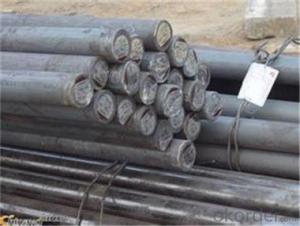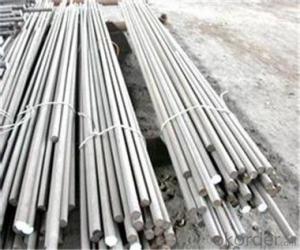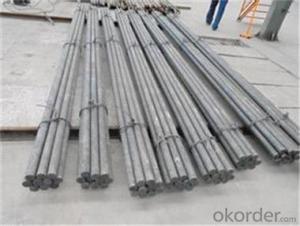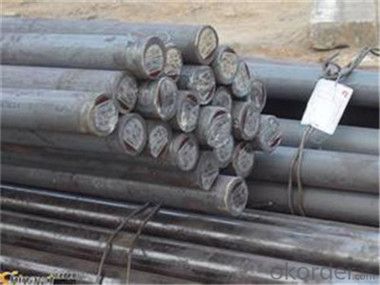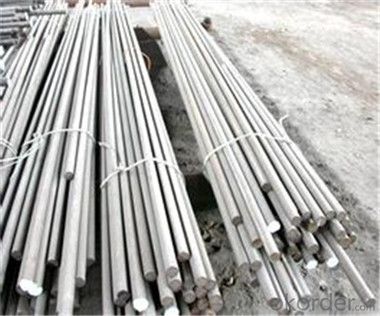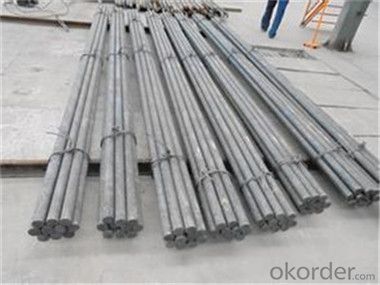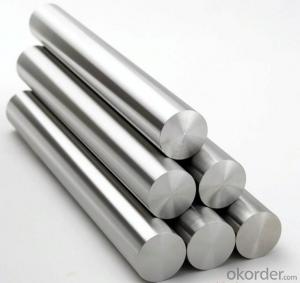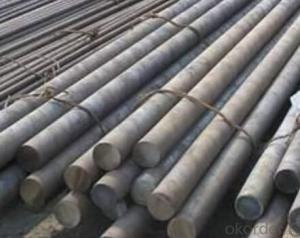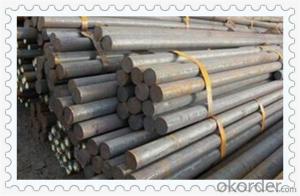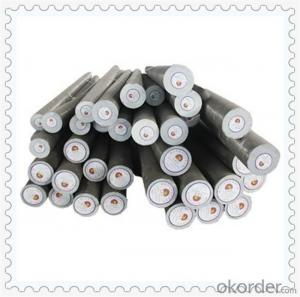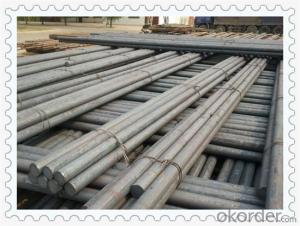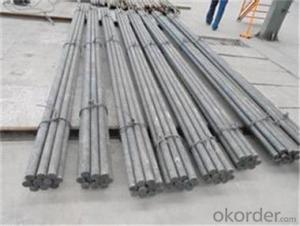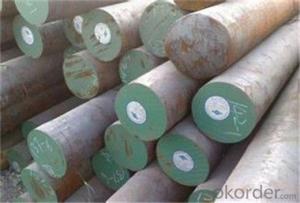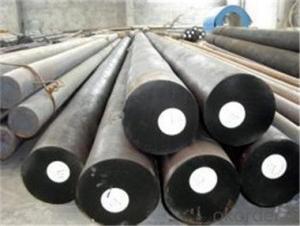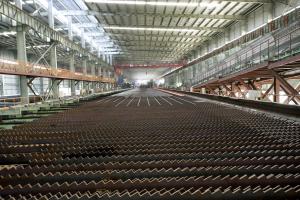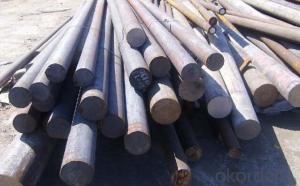Hot Rolled Carbon Steel Round Bar MS Bar -China
- Loading Port:
- Tianjin
- Payment Terms:
- TT OR LC
- Min Order Qty:
- 88 m.t.
- Supply Capability:
- 2000000 m.t./month
OKorder Service Pledge
OKorder Financial Service
You Might Also Like
Description of steel round bar:
1. Commodity: Round steel bar
3. Technical: Hot rolling
2. Length: Min. 5.8meter, according to requirement.
3. Diameter: 16mm-250mm
5. Packing: In Bundle or according to your requirements.
Festures of steel round bar:
Description : Steel Bar/Stainless Steel Round Bar/Alloy Steel Round Bar/Carbon Steel Bar
Stainless Steel Bright Bar/Stainless Steel Peeled Bar/Stainless Steel Polishing Bar
Diamater:
1 Hot rolled round bar diameter from 5.5mm to 110mm
2.Hot forged round bar diameter from 110mm to 400mm
3.Cold drawn round bar diameter from 2.0mm to 60mm
4.Grinding bar diameter from 4.0mm to 40mm
5.Turn smooth diameter from 40mm to 250mm
Specifications of steel round bar:
Length: standard 6m,9m,12m, or as customers' requirement
Surface: Black, polished, grinded, ,Bright, Turn smooth(Peeled),Brush,Mill,Pickled
Process:Hot rolled,cold drawn,forged
Packing: In bundle, tied by steel straps, covered with protecting film Use wooden box, fill with foam to keep the surface from damaging
Images of steel round bar:
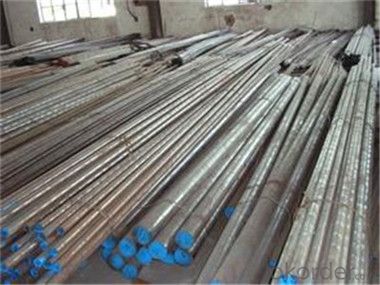
FAQ:
1. How long is the lead time?
Delivery time: 45 days after order confirmed.
2. What payment term do you accept?
Payment: T/T or L/C at sight.
3.Why do you choose to cooperate with us?
We have over10 years experience in this business so we are able to provide you the high quality products with the best price.
- Q: Are steel round bars suitable for the manufacturing of shafts?
- Yes, steel round bars are highly suitable for the manufacturing of shafts. Steel round bars offer excellent strength, durability, and resilience, making them ideal for applications that require transmitting power, such as in shafts. Their uniform shape and consistent diameter also facilitate ease of machining and assembly, further enhancing their suitability for shaft manufacturing.
- Q: What is the elasticity of a steel round bar?
- The ability of a steel round bar to return to its original form and size after external forces or deformations is referred to as its elasticity. Steel is renowned for its high elastic modulus, indicating its resistance to deformation and ability to withstand significant stress before permanently bending or breaking. The composition of a steel round bar, specifically its carbon content and the inclusion of other alloying elements, determines its elasticity. Generally, steel with higher carbon content possesses greater elasticity and can be more easily manipulated without enduring permanent deformation. Nonetheless, it is noteworthy that factors like temperature, strain rate, and any defects or imperfections in the material can also influence the elasticity of a steel round bar.
- Q: What is the maximum aluminum content allowed for steel round bars?
- The aluminum content permissible for steel round bars fluctuates based on the particular steel grade and industry norms. Generally, the aluminum content in steel round bars is commonly restricted to a maximum range of 0.03-0.06% for the majority of commercial and structural steel grades. Nevertheless, certain specialized steel grades, particularly those employed in the aerospace sector, may permit higher levels of aluminum content. It is crucial to refer to the technical specifications or industry norms of the specific steel grade to ascertain the maximum permissible aluminum content for steel round bars.
- Q: Specifications of the same kind of galvanized round bar more expensive than round steel?
- The general market price than ordinary steel galvanized steel bar of your 2000-3000 dollars per ton, according to your purchase requirements, price range of relatively large fluctuations, such as whether to open a formal invoice, transport distance, purchase quantity, relationship with your level of economic development, the developed area of fierce market competition, the price is relatively low. The prices and prices of large factories and small factories are not the same. The prices of big factories are generally high, and the prices of small factories are low.
- Q: What are the advantages of using cobalt-alloy steel round bars?
- Using cobalt-alloy steel round bars in various industries and applications offers several advantages. Firstly, this type of steel is exceptionally strong and hard, providing resistance against wear, corrosion, and high temperatures. This makes it suitable for demanding environments where other materials would quickly degrade. Secondly, cobalt-alloy steel maintains its shape and size even under extreme conditions, demonstrating excellent dimensional stability. This makes it ideal for applications that require precise tolerances and minimal deformation, such as in the aerospace and automotive industries. Moreover, cobalt-alloy steel retains its mechanical properties at elevated temperatures, showcasing excellent heat resistance. This makes it valuable in applications involving high-speed machining, cutting tools, and turbine components. Additionally, cobalt-alloy steel round bars are easily machined and fabricated, offering versatility and customization in various applications. Their high machinability and weldability make them suitable for use in manufacturing processes like forging, casting, and machining. Furthermore, cobalt-alloy steel round bars exhibit excellent fatigue resistance, ensuring long-lasting performance and durability. This makes them suitable for applications involving repetitive stress or cyclic loading, such as shafts, springs, and fasteners. Lastly, cobalt-alloy steel is biocompatible, making it suitable for medical and dental applications. Its corrosion resistance and biocompatibility properties make it commonly used in orthopedic implants, surgical tools, and dental instruments. In conclusion, the advantages of using cobalt-alloy steel round bars include exceptional strength, hardness, and dimensional stability, as well as heat resistance, machinability, fatigue resistance, and biocompatibility. These qualities make them valuable across a wide range of industries and applications, offering reliability, durability, and performance.
- Q: What are the advantages of using free-cutting steel round bars?
- There are several advantages to using free-cutting steel round bars. Firstly, they offer improved machinability, which means they can be easily and efficiently machined into various shapes and sizes without excessive tool wear or power consumption. This leads to increased productivity and reduced manufacturing costs. Additionally, free-cutting steel round bars have excellent chip formation properties, resulting in better surface finish and dimensional accuracy of the machined parts. They also exhibit enhanced surface hardness and wear resistance, making them suitable for applications that require durability and strength. Lastly, these bars are readily available and cost-effective, making them a preferred choice for many industries.
- Q: What are the maximum allowable stresses for steel round bars?
- The maximum allowable stresses for steel round bars depend on various factors such as the grade of steel, the type of loading, and the design code being followed. In general, the maximum allowable stress for steel round bars is determined by the yield strength of the steel. The yield strength is the stress at which permanent deformation or yielding of the material occurs. Different grades of steel have different yield strengths. For example, mild steel typically has a yield strength of around 250 MPa (megapascals), while high-strength low-alloy (HSLA) steel can have a yield strength of up to 550 MPa. To determine the maximum allowable stress, typically a safety factor is applied to the yield strength. This safety factor takes into account uncertainties in material properties, loadings, and potential variations in manufacturing processes. The safety factor can vary depending on the application and design code being followed. For example, in structural steel design, the American Institute of Steel Construction (AISC) specifies a safety factor of 1.67 for the yield strength. This means that the maximum allowable stress would be the yield strength divided by 1.67. It is important to consult relevant design codes, standards, or engineering specifications for specific applications to determine the appropriate maximum allowable stresses for steel round bars.
- Q: Can steel round bars be used in the manufacturing of mining equipment?
- Yes, steel round bars can be used in the manufacturing of mining equipment. Steel round bars are often used as a raw material in the fabrication of various components and parts for mining equipment due to their high strength, durability, and resistance to wear and tear. These bars can be machined, forged, or welded into different shapes and sizes to meet the specific requirements of mining equipment, such as drill bits, conveyor systems, crushers, and support structures.
- Q: Can steel round bars be used for making renewable energy systems?
- Indeed, the utilization of steel round bars is feasible for the production of renewable energy systems. Steel, being a versatile material, finds extensive usage across multiple industries, including the renewable energy sector. Its robustness, longevity, and resistance against corrosion render it an ideal choice for fabricating frameworks, support structures, and components of renewable energy systems. For instance, steel round bars serve as an excellent building material for manufacturing wind turbine towers, solar panel frames, and support structures for hydroelectric power systems. Wind turbine towers necessitate a sturdy and stable structure to bear the weight of the turbine and endure the forces exerted by the wind. In this regard, steel round bars provide the requisite strength and stability, thereby ensuring the safety and efficiency of wind turbines. Similarly, solar panel frames require a sturdy construction capable of supporting the panels' weight and withstanding adverse weather conditions. Steel round bars can be employed to construct durable frames that securely hold the solar panels in place. Moreover, in the context of hydroelectric power systems, steel round bars prove invaluable in erecting support structures for various components like turbines, generators, and penstocks. Given the colossal pressure and force exerted by water flow, these structures need to possess the necessary durability and strength, making steel an exceptional choice for this purpose. All in all, steel round bars represent a dependable and frequently employed material in the construction of renewable energy systems. Their strength, durability, and resistance to corrosion render them suitable for diverse applications, thereby contributing to the long-term viability and sustainability of renewable energy sources.
- Q: What are the different surface treatments available for alloy steel round bars?
- There are several different surface treatments available for alloy steel round bars. Some of the most common treatments include: 1. Hot-dip galvanizing: This process involves dipping the steel bars into a bath of molten zinc, which creates a protective coating on the surface. This treatment helps to prevent rust and corrosion. 2. Electrogalvanizing: Similar to hot-dip galvanizing, electrogalvanizing also involves applying a layer of zinc to the surface of the steel bars. However, in this process, an electric current is used to deposit the zinc onto the steel. 3. Nitriding: Nitriding involves exposing the steel bars to a nitrogen-rich environment at high temperatures. This treatment forms a hard, wear-resistant layer on the surface of the bars, enhancing their strength and durability. 4. Chrome plating: Chrome plating is a process in which a thin layer of chromium is applied to the surface of the steel bars. This treatment provides excellent corrosion resistance and enhances the aesthetic appearance of the bars. 5. Powder coating: Powder coating involves applying a dry powder to the surface of the steel bars, which is then cured through a heating process. This treatment creates a durable and attractive finish, offering protection against corrosion, chemicals, and UV rays. 6. Polishing: Polishing is a process that involves mechanically smoothing and shining the surface of the steel bars. This treatment enhances the visual appeal of the bars and improves their resistance to corrosion. These are just a few of the many surface treatments available for alloy steel round bars. The choice of treatment will depend on the specific requirements of the application, including factors such as desired appearance, corrosion resistance, and wear resistance.
Send your message to us
Hot Rolled Carbon Steel Round Bar MS Bar -China
- Loading Port:
- Tianjin
- Payment Terms:
- TT OR LC
- Min Order Qty:
- 88 m.t.
- Supply Capability:
- 2000000 m.t./month
OKorder Service Pledge
OKorder Financial Service
Similar products
Hot products
Hot Searches
Related keywords
